"People, Places, Subjects" - BBC Topic and Guardian keyword pages: Part 1
Some time in 2001 I went to my first ever meeting with people from BBC News Online. I was enthusiastic, fresh-faced, and completely oblivious to the 'difficult sibling' history that existed between the BBC New Media & Technology department where I worked, and the senior managers from BBC News Online that I was meeting.
I suggested they do two things. Firstly, remove the 'noindex' meta tag at the individual story level on news.bbc.co.uk. Secondly, based on the evidence of search logs, they should make individual index pages for each country, which featured the latest news stories from that part of the world.
The first suggestion was a no-brainer.
And the second?
Well, some 7 years later, the BBC have launched /topics - with country pages as one of the major components.
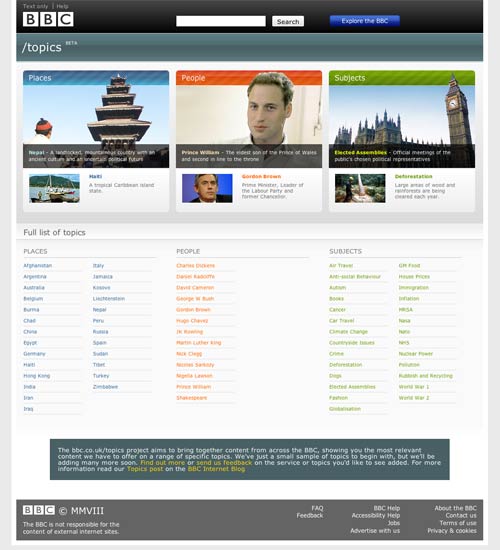
Of course, there is much more to the BBC Topics pages than my humble 'country index' idea, not least of which is a new technical publishing platform and infrastructure for the bbc.co.uk site.
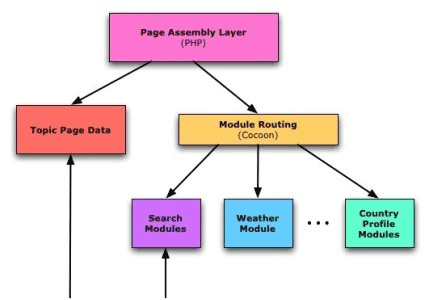
Over the next few days I want to look at some of the aspects that interest me about these pages. But I don't want to look at them in isolation.
I saw several similar concepts to the Topics page worked on at the BBC over the years, including 'iPages', and the idea of 'Editorialised search result pages' with content and a look'n'feel appropriate to the topic. Whilst the BBC has been mulling over these options, and debating whether the weather, science or news departments should 'own' subjects like "climate change", The Guardian's website has stolen a march on them.
They've pretty much built the exact same thing with their 'keyword index' pages. These aggregate the latest stories from across the paper that are on a given topic, are set in a certain place, or are about about a specific person. They started going live with the re-design of The Guardian's Travel site some 18 months ago, and in the course of this review I'll be comparing and contrasting the features available on both sites.
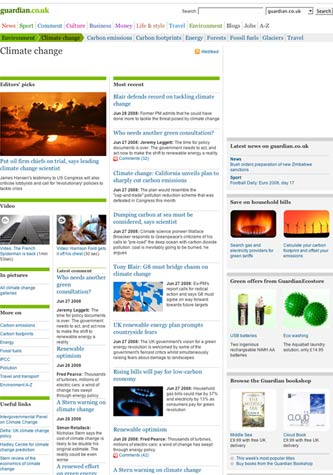
(In a totally willful Anglo-centric way, I'm going to ignore the New York Times 'Topic' pages, which would have made an equally valid comparison)
People, places, subjects vs 'Concepts'
There is an immediate contrast between the two sites in the type of 'topic' or 'keyword' they use. The BBC has orientated their offering around three explicit groupings of 'people', 'places' and 'subjects'. The Guardian seems more concerned with identifying 'concepts'.
There is not a Guardian keyword page for 'Prince William', for example. Guardian content about the royal family, whether it is William or Beatrice in focus, is grouped instead under a general 'Monarchy' concept.
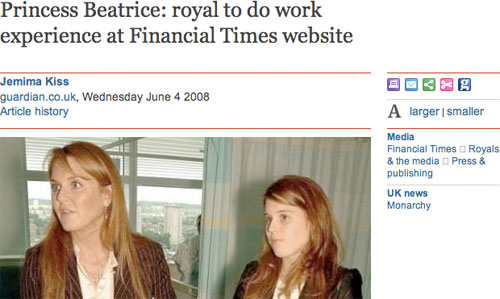
Likewise, coverage of business stories on The Guardian does not seem to have keywords focussed on specific personalities or on company names, unless they have become a major story like 'Northern Rock' or 'Bradford & Bingley', Instead, the keywords focus on broader economic concepts.

Classification hierarchy
Since the BBC has only initially launched with a selection of 60+ pages, it is yet to encounter any serious classification issues. The Guardian has already rolled their classification system out across nearly all Guardian content, and so has had experience of the type of conflicts that can occur.
The Guardian has opted for a very flat hierarchy. There are top-level categories, which equate to the major navigation sections of the site, and these appear in bold in the keyword lists that appear next to an article. All other keywords appear, to the user at least, to be at the same level of hierarchy.

Content or archive?
In some ways the BBC Topic pages are akin to an editorial one-off page, whilst The Guardian 'keyword indexes' are much more like search results. This is particularly notable at the foot of the page, where The Guardian includes pagination.
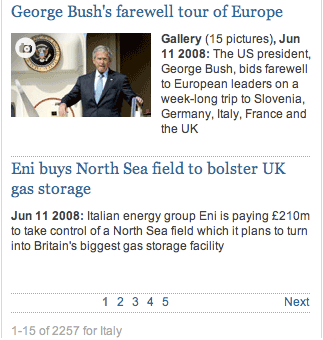
By skipping back through time using these links, on a Guardian keyword index you can trace the history of everything the paper has published online about a specific topic. The BBC are providing much more of an 'overview' service here - The Guardian's is more like a topic 'archive'.
Next...
In the next part of this series I'll be looking at the provision of RSS feeds and the URL structures of the BBC Topic and Guardian 'keyword index' pages.
The Guardian have done some kind of topics page for quite a few years on their old design - the old Media Guardian site (prior to the revamp) had "Special Report" sections which were basically aggregated sets of stories on a topic - e.g. the BBC, "Hutton and the BBC" etc.
I don't read much outside of the Media section so don't know how widespread they were.
Do you have any ideas about how the Guardian system works, and which search software they use?
Erm, yes. But I also have an ongoing verbal NDA with them, sorry. However, Stephen Dunn will be at OpenTech tomorrow talking about their CMS, so some of it will be a bit further into the public domain then.
your second suggestion which was "they should make individual index pages for each country, which featured the latest news stories from that part of the world."
that was the base idea of the thing we know today as google news. actually what BBC did 7 yrs after your suggestion , google news seems to take it right from beginning , they show localized news pages for local countries. similarly we have ipages = igoogle and so on , i wonder was it you who blink this idea to google , just my 2 cents
This probbably has something to do with the fact that historically BBC has more international exposure therefore covers more international news while the Guardian are more focus on the UK market.
your second suggestion which was "they should make individual index pages for each country, which featured the latest news stories from that part of the world."
that was the base idea of the thing we know today as google news. actually what BBC did 7 yrs after your suggestion , google news seems to take it right from beginning , they show localized news pages for local countries. similarly we have ipages = igoogle and so on , i wonder was it you who blink this idea to google , just my 2 cents